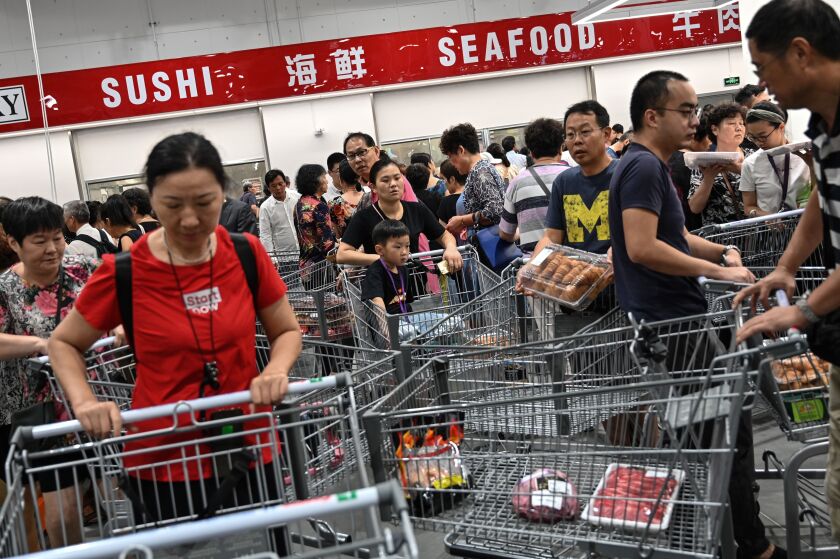
Supermarkets in China are becoming increasingly pervasive. The greater part of these chains have shares held by remote investments and just a couple of them are completely local.
China’s staple retail advertise was estimate to develop by 32.6% to 2022. Be that as it may, staple retailers in China have been facing difficult circumstances.
There are a ton of supermarkets in China, for example, Wal-Store, Metro, Carrefour, Trust-shop, Tesco, and others. Regardless of these difficult circumstances, succeeding as a supermarket in China is as yet conceivable, Aldi and Costco are the living verification of this.
This article investigates the explanation behind Aldi and Costco’s achievement in the Chinese market.
Does the supermarket despite everything work in China?
In 2019, with the abrupt increase in online retail, numerous supermarkets confronted surprising difficulties, seeing deals available lessening. The inclinations of Chinese customers are changing and supermarkets should grasp these new patterns.
Online and offline supermarkets integrations
Another time is evolving for the supermarket industry in china. A methodology that integrates both online and offline encounters and depends intensely on digitalization and customer information. For instance, the Hema (Supermarket opened by Alibaba) application unites online and offline retail experience altogether to give an omnichannel experience to its clients.
Chinese purchasers can without much of a stretch output scanner tags through the Application to find out item information, process installments or get items conveyed to home within 30 minutes.
Establishing organization with China’s internet goliaths, for example, Alibaba, Tencent and JD.com will permit retailers the entrance to various instruments and capacities alluring to Chinese customers.
For any situation, consideration should consistently be paid to unexpected changes in the Chinese market, supermarkets should further improve client innovation and involvement with request to stay aware of the area.
Advanced innovation in supermarkets
In request to react to the quick computerized development, numerous brands have set up likely arrangements to improve current advancements in-store by becoming more simulated intelligence situated. Advancements like:
- registration machines incorporate facial acknowledgment installment work
- cutting edge ‘automated’ stores
How Aldi and Costco entered the Chinese market?
Despite the fact that Carrefour’s disappointments, which sold its 80% stake in its China tasks to neighborhood retailer Suning, had tossed a cover over the eventual fate of supermarkets in China, in 2019 the remote supermarket chains Aldi and Costco entered the Chinese market.
In 2019, the German supermarket chain Aldi and the US supermarket chain Costco both opened their first physical stores in Shanghai. A great many Chinese individuals lined up outside and trusted that the shops will open just because, since their opening, have pulled in tremendous hordes of customers, however why?
Chinese buyers are interested about the new food retail designs and new deals systems and these two supermarkets keep the interest of customers alive. For instance, a major factor that has credited Costco’s prosperity so far is that it offered extravagance items, for example, Hermes packs at a sensible cost at the store’s introduction.
How Aldi and Costco are developing their marketing procedures to arrive at Chinese buyers?
Using Chinese advanced stages to advance and sell their items is their significant marketing system. For instance, both Aldi and Costco have restricted their methodologies for the Chinese market:
- creating a mandarin site, facilitated in China,
- selling on Chinese web based business stages like Tmall,
- promoting their items on Chinese online networking like Wechat, Weibo and Xiaohongshu.
Aldi marketing technique to enter the Chinese market
Aldi stores are altered and custom fitted explicitly for the China showcase. Indeed, the stores offer an integrated online to offline retail encounter and include an output and go work on WeChat that lets clients to avoid the line.
Opening of Tmall worldwide store with the point of to test the Chinese market
Aldi has tried the necessities of the Chinese, and when all is said in done, the Chinese market by launching a lead store on Tmall Worldwide. On Tmall, Aldi sells modest, great private-mark things, for example, dried apricots, Knoppers chocolate wafers, etc, giving clients the choice of purchasing imported cross-fringe internet business things that might be increasingly hard to find in China.
Tmall Worldwide is the Tmall cross-fringe web based business stage which offers marks the chance to:
- sell their items without having a physical nearness in China
- skipping over protracted item enlistment and endorsement forms.
Aldi’s Tmall worldwide store gave it a channel to test new items and clients’ response to them, without incurring long desk work to send out them and avoiding inventory dangers.
source :
